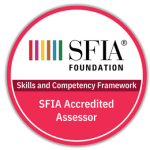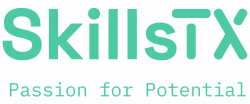SFIA Assessment Scheme
The SFIA Foundation have defined an accreditation scheme
-
Category A
SFIA Accreditation for Individuals, for their knowledge and experience in using SFIA (including SFIA Practitioners, Consultants, Trainers and Assessors) -
Category B
Certification for Professionals whose skills and competencies are described using SFIA, and wish to be recognized for their Knowledge, Skill and Competency -
Category C
SFIA Accreditation for Organizations who use SFIA (including SFIA Partners etc) Under the scheme, certification bodies can set up their own scheme and seek approval from the SFIA Foundation. Once approved, the certification body can award SFIA-based Digital Credentials / Badges. Assessment of individuals has to be carried out by a SFIA Accredited Assessor, who has a current licence/accreditation from the SFIA Foundation.
SkillsTX have been designated an Approved Assessment Partner by the SFIA Foundation. SkillsTX have worked with APMG and the SFIA Foundation to define a SFIA Assessment Scheme, and are approved to offer assessment services resulting in the issuing of badges by APMG through the Credly platform. This service will assess individuals under category B above.
Assessments are carried out by SFIA Assessors, accredited by the SFIA Foundation and listed on the SFIA Foundation website. Our current Accredited SFIA Assessors include :
 Scott Bennett
Scott Bennett Richard Ellison
Richard Ellison Paul Collins
Paul Collins Phil Lovell
Phil Lovell Daniel Merriott
Daniel Merriott Liane Taylor
Liane Taylor Tristan Boot
Tristan Boot Cyrille Zimmer
Cyrille Zimmer- We have a number of other Assessors going through training and experience building as part of the process to qualify for accreditation by the SFIA Foundation. During this period they are supervised and coached by an Accredited SFIA Assessor. Anyone wishing to be trained and work towards accreditation please contact us.
Why this is needed?
01.
For the individual
- Professional recognition
- Help in job applications and promotions
- Independent external confirmation of your skills and competencies
- Alignment with an internationally adopted skills and competencies framework (common language)
02.
For employers
- Recruitment – hire people based on their skills and competencies (independently certified), not just their training certificates (which often only confirm theoretical knowledge and not practical experience)
- Professional development and recognition – retain your best people in a market of skills shortages and people moving on due to lack of development opportunities and professional recognition
- Alignment with an internationally adopted skills and competencies framework (common language)
03.
For Governments
- To identify skills strengths and targets, and support strategic planning including education provision
- To support immigration and employment decisions
- Alignment with an internationally adopted skills and competencies framework (common language)
04.
For Education, Training Providers, Certification Bodies, and Professional Bodies
- To help people select the most appropriate actions for their development needs
- Alignment with an internationally adopted skills and competencies framework (common language)
How does it work?
Assessee completes SFIA self-assessment to confirm the skills and competencies they think that have
Assessee submits their application requesting assessment for up to 6 SFIA skills
- Assessee identifies which skills they want to be assessed for
- Assessee agrees to their data being sent to APMG and Credly so badges can be awarded
Assessee or their Employer pay fees for assessment and badges
SFIA Accredited Assessor assesses Assessee and determines which badges can be issued
SkillsTX system passes data to APMG
- First Name, Last Name, Email address, badges to be issued, award date, expiry date etc.
APMG pass data to Credly Acclaim
Credly Acclaim platform emails individual to invite them to accept the badge(s)
Assessee accepts badges on Credly (using existing Credly account or setting up a new one)
Data sent back to SkillsTX system to confirm issue of badges and provide unique badge URLs so that they can be added in the Evidence section of the Assessee’s skills profile
What is assessed?
The scheme aims to certify that individuals for one or more of the following elements:

Knowledge
provide sufficient evidence that they possess the relevant knowledge appropriate to the SFIA element being assessed. A minimum cognitive level of “can explain” should be demonstrated, but a candidate may also meet the higher cognitive level of “can discuss”.
NOTE: These badges are not issued by assessors but instead are mapped to relevant education and issued as a result of successfully completing training courses.
The ability to explain the knowledge and use of knowledge relevant to the SFIA skills or responsibility attribute at the level being assessed.

Skill / Proficiency
provide sufficient evidence that they have applied the relevant knowledge and performed the described activity at the performance level of “proficient in the skill” i.e. they can do what SFIA describes on their own without instruction.
The ability to provide sufficient evidence that the applicant has applied the relevant knowledge and performed the described activity at the performance level of “proficient in the skill” i.e. they can do what SFIA describes on their own without instruction.
The issue of a certificate or digital credential for Skill should be viewed as demonstrating the individual has also met the criteria for Knowledge, and therefore anyone successfully assessed at this level will not need a separate certificate or digital credential for Knowledge for this same SFIA element.
Mandatory requirements
Failure to satisfactorily meet any of the following will result in the accreditation application being rejected.
- Demonstrate practical experience of carrying out the activity described by SFIA (85% or more of the SFIA description)
- Whilst instruction may have been given during the development of the skill, certification of achievement under this scheme requires that the activity has been carried out independently without instruction being given while performing the activity.
- Activity successfully performed several times to the expected level of quality
- Achieving the expected outcomes or deliverables
- Evidence provided is recent, i.e. no longer than 7 years ago
- Skill developed sufficiently as to be ready to apply this skill in a professional working environment

Competency
provide sufficient evidence that they have applied the relevant knowledge and skills, and have significant professional experience of performing the activities described by SFIA in a professional working environment through the performance of a job, role or function. They must consistently achieve expected objectives and a successful result on an ongoing basis, reliably at a professional level. The experience in a professional working environment represents the difference between a demonstrated skill and demonstrated Competency.
The issue of a certificate or digital credential for Competency should be viewed as demonstrating the individual has also met the criteria for Knowledge and Skill, and therefore anyone successfully assessed at this level will not need separate certificates or digital credentials for Knowledge or Skills for this same SFIA element.
Mandatory requirements
Failure to satisfactorily meet any of the following will result in the accreditation application being rejected.
- Demonstrate practical experience of carrying out the activity described by SFIA (85% or more of the SFIA description)
- Provide evidence that this experience of performing the activities described by SFIA is in a professional working environment through the performance of a job, role or function
- Activity has been carried out independently without instruction being given while performing the activity.
- Activity performed several times or over an extended period of time (12-months or more)
- Achieving the expected outcomes or deliverables
- Consistently achieve expected objectives and a successful result on an ongoing basis, reliably at a professional level
- Evidence provided is recent, i.e. no longer than 7 years ago
Notes on Competency
- Competence or Competency is defined as the “ability to apply knowledge and skills to achieve intended results”. However, the ISO/IEC 24773-1:2019 standard also notes that “results are defined with respect to tasks, functions or responsibilities which in turn are job/role/title-related. The word competency and competencies can be used as synonyms of competence and competences. Competence can be used to refer to general ability (e.g. overall competence), while competency can be used to refer to a specific ability (e.g. competency in design of user interfaces). The word competence is used in this document to refer to a general ability; and the word competency is used in this document to refer to a specific ability”. As a result of this distinction, this scheme uses the term ‘competency’ as the certification or digital credentialing relates to a specific SFIA skill or attribute rather than a more general ability.
- The ability to provide sufficient evidence that the applicant has developed proficiency at a professional level through application of the knowledge and skill in a professional working environment. Applicants will have to demonstrate that they have met the mandatory requirements listed below, and that they are professionally competent due to significant experience in the workplace. Effectively, certification at this level is confirming that the applicant has demonstrated they have fully developed this skill or responsibility attribute at the certified level, and that their development is at a different level or in a difference skill or attribute.
- This aligns with the requirements and notes stated in ISO/IEC 24773-1:2019 the international standard for “Software and systems engineering — Certification of software and systems engineering professionals”, which is based on, and builds upon ISO/IEC 17024:2012 the international standard for “Conformity assessment — General requirements for bodies operating certification of persons”

Competence
“overall competence in a role, job or professional profile”
SFIA is used to assess roles, jobs, professional achievement, or other forms of overall competence where a number of SFIA elements are combined and assessed together, for example “Business Analyst” or “Chartered IT Professional (CITP)”
In these cases, the certification body has defined overall competence for each credential as a group of individual SFIA competencies at certain levels.
Certification scheme which define roles, jobs, professional profiles such as certifications for professional status, may use SFIA to define a set of criteria. As an example, a body may create and award a credential for “Expert CIO”, and define the characteristics or requirements in SFIA terms – maybe Autonomy level 7, Influence level 7, Complexity level 7, Business Skills level 7, Knowledge level 7, Strategic planning (ITSP) levels 6 and 7, Governance (GOVN) levels 6 and 7, Organizational capability development (OCDV) level 7, and Performance management (PEMT) level 7.
The SFIA Foundation could endorse the use of SFIA on the basis that individual SFIA competencies are assessed following the SFIA accreditation scheme principles. The SFIA Foundation are not endorsing the structure of the credential and thereby saying that this represents a universal view of what makes an Expert CIO, as there may be several different views on this. The details of the credential should be published and accessible, showing which individual SFIA competencies have been assessed and demonstrated satisfactorily.
The SFIA Foundation do award a limited number of accreditations that demonstrate overall competence, defined by a set of individual SFIA competencies. These are covered in category A of the scheme, and include SFIA Accredited Practitioner, SFIA Accredited Assessor and SFIA Accredited Consultant.
The first badges launched are the full set of Skill (Proficiency) and Competency badges, available for all 121 skills at each of the levels described by SFIA8. Knowledge badges are available by successfully completing mapped training courses.
To request certification for yourself complete this form, or to discuss this for your people, please contact us or one of our SkillsTX Partners.


